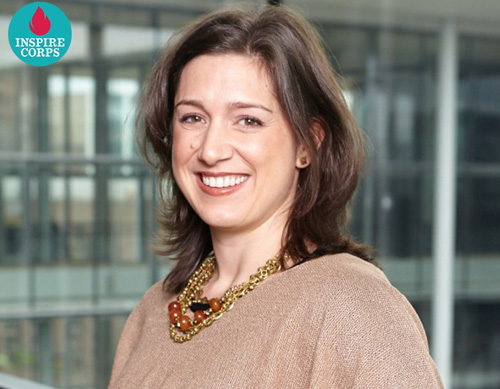
FLY members and their mentors enjoyed a lunch talk with Allison Holzer on May 16: Be an Inspiring Mentor and Mentee Using Applied Positive Psychology and Emotional Intelligence. Allison is co-founding partner and Chief Innovation Officer at InspireCorps, a firm dedicated to smart, sustainable inspiration of leaders, teams, and organizations.
The workshop began with some reflective questions: Think of a mentor that has influenced you. What did they do, say, how did they make you feel? How did they influence the people around you?
Allison shared a clip from movie Invictus, in which Morgan Freeman portrays Nelson Mandela, and talks about how we have to “exceed our own expectations.”
Some of the key takeaways and topics we covered for mentors and mentees were:
- Our task as inspiring mentors is to help our mentees. As mentors, we inspire others in different ways; we can learn from the leaders/mentors who have inspired us.
- We “Power up” mentoring by acknowledging the progress and strengths of our mentees and generating positive emotions with them.
- Progress (Teresa Amabile, Harvard, TED Talk): Acknowledge progress more often by celebrating:
- big accomplishments,
- small wins,
- breakthroughs,
- steady forward movement,
- goal completion,
- learning from failure, and
- positive impact on others.
- Strengths (Gallup, Chris Peterson): Employees who use their strengths regularly at work have less turnover and better productivity. We need to help our mentees know their strengths and lead with them regularly.
- Positive Emotions: Emotions are adaptive. Negative emotions (anger, fear, sadness, frustration) are data that help us understand we may need to create a boundary or take action, and they provide us with a sense of focus and help us search for errors. Positive emotions (joy, amusement, serenity, awe) help us broaden our thinking, be creative, and build relationships (Fredrickson, UNC).
- 4-3-2-1 Check in: See attached tool to guide a 4-3-2-1 check in with your mentee. This tool will help you focus on their progress and strengths and cultivate positive emotions.
- Sponsor: Be extraordinary mentors by sponsoring (taking action on behalf of mentees); research shows this tends to be a more natural role for men and is an opportunity for women to stretch into this role more often.
- Examples of sponsoring include: sharing insider information, providing feedback that others don’t give, helping mentee through obstacles, taking action on mentee behalf, actively making connections for mentee.
The workshop ended with an assignment from Allison to walk away with at least one new idea to put into practice to “power up” existing mentor-mentee relationships, and with accountability partners to support each other in these efforts.
Write-up by Mela Toro Waters.